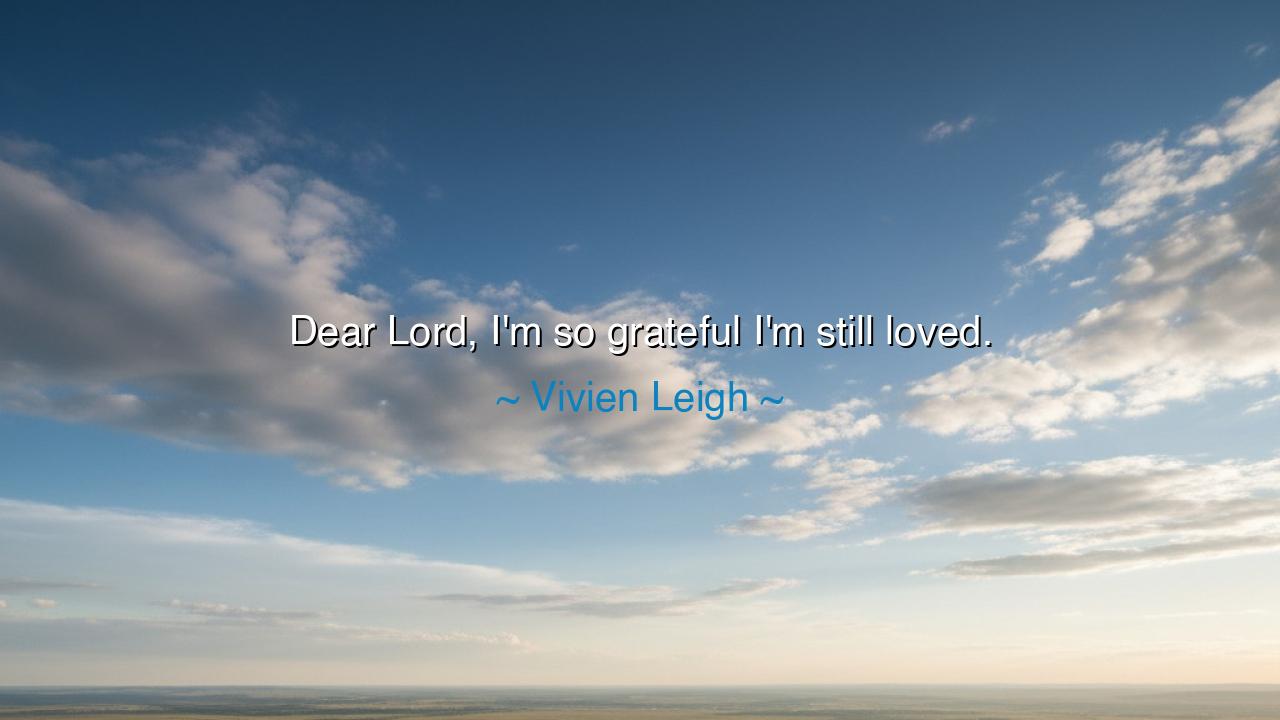
Dear Lord, I'm so grateful I'm still loved.






The words of Vivien Leigh, “Dear Lord, I’m so grateful I’m still loved,” rise with the quiet trembling of a soul that has known both glory and sorrow, both triumph and loneliness. In this simple prayer lies the depth of human longing: not for crowns or wealth, not even for health or fame, but for love that endures when all else fades. Leigh, who once dazzled the world as Scarlett O’Hara in Gone with the Wind, knew the heights of adoration and the depths of despair. Her words are thus not mere sentiment but a confession: in the storms of life, the anchor of being loved is the greatest treasure of all.
To say “I’m so grateful” is to recognize that love is not owed, nor guaranteed, but a gift renewed each day. The ancients spoke often of this truth. In the epics of Homer, heroes craved not only victory but the embrace of home, the assurance that beyond their battles they were still cherished. Odysseus endured years of wandering, yet what gave him strength was the thought of Penelope waiting with steadfast love. So too did Leigh’s words echo this timeless truth: it is not victory in the world that sustains the heart, but the assurance that one remains precious to another.
The phrase “I’m still loved” carries with it the weight of fragility. To be “still” loved means that time has passed, wounds may have come, beauty may have faded, mistakes may have been made, yet love remains. This is not the love of fleeting admiration or the applause of crowds, which vanish as quickly as they come. This is the deeper love — enduring, forgiving, unshaken. To be still loved is to be known in weakness and yet embraced. In this, Leigh touches the heart of what all souls yearn for: the assurance that love will not desert us when we are most vulnerable.
History gives us witness to this. Consider Ludwig van Beethoven, who, though hailed as a genius, suffered the agony of deafness, isolation, and despair. In his loneliness, he confessed that the only thing that kept him from ending his life was the memory of being loved and the possibility of still giving love through his music. Though the world honored him as a titan, it was love that saved him as a man. Leigh’s prayer, like Beethoven’s struggle, reveals that beyond all human accomplishments, the flame of love is the true sustainer.
Her words also speak of humility. To pray in gratitude for being loved is to recognize that love is never commanded but freely given. It is not won by status, nor held forever by beauty or talent. Fame, which Vivien Leigh knew well, is fickle; one day it exalts, the next it abandons. But love, when true, surpasses the fickleness of fortune. In giving thanks for love, she bows her soul in humility, acknowledging that to be loved is not her achievement but a grace.
The lesson for us is clear: if we possess love, we are rich, no matter what else we lack. We must learn to treasure those who still love us — family, friends, partners, or the divine — for this is the foundation of human strength. Gratitude for love deepens bonds, heals wounds, and softens pride. To forget that we are loved is to stumble into despair; to remember it is to stand again with courage, even in the darkest hour.
As practical action, pause each day to give thanks for those who still love you. Speak your gratitude aloud, for love grows when acknowledged. And likewise, extend love to others, for there may be those who, like Leigh, cling to the fragile hope that they are still loved. Your kindness, your forgiveness, your faithfulness may be the very anchor that keeps another soul steady in the storm.
Thus, Vivien Leigh’s simple prayer is transformed into a timeless teaching: be grateful that you are still loved, for love is the greatest gift, stronger than fame, wealth, or power. To be still loved is to be still human, still held, still valued. And in this gratitude, the weary heart finds peace, and the soul learns to endure.






AAdministratorAdministrator
Welcome, honored guests. Please leave a comment, we will respond soon